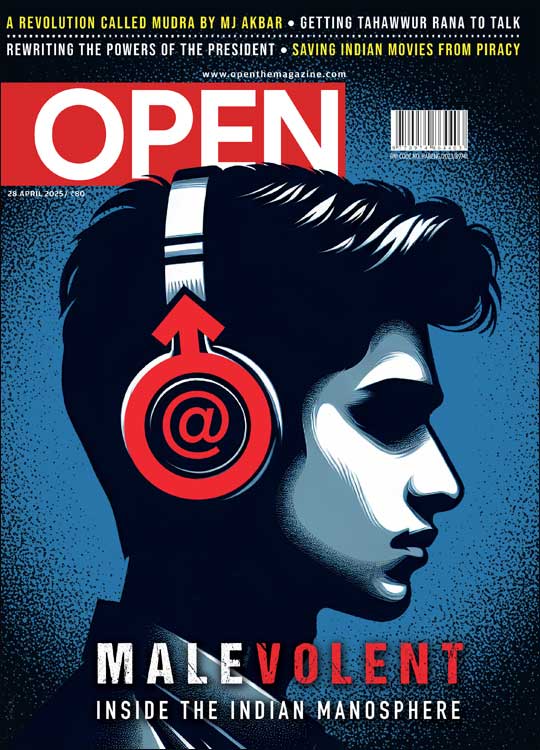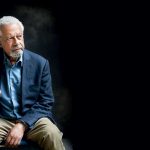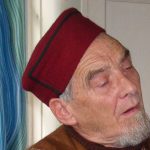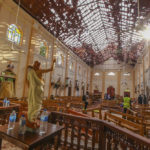The Nanny Who Saved Baby Moishe
...and became a star in her adoptive homeland Israel passed through Mumbai recently—home to her famous 26/11 derring-do—unnoticed, unsung. Open caught up with her
 Aimee Ginsburg
Aimee Ginsburg
 Aimee Ginsburg
|
21 Apr, 2011
Aimee Ginsburg
|
21 Apr, 2011
/wp-content/uploads/2015/11/moishe.jpg)
…and became a star in her adoptive homeland Israel passed through Mumbai recently—unnoticed, unsung. Open caught up with her.
No one but me notices the petite, self-assured woman entering Leopold Café and making her way towards my table, two plastic carrybags in hand, her youthful wavy hair tied determinedly off a face that has grown lovelier since I last saw her. If they knew that she was Sandra Samuel, the Heroic Nanny of 26/11 Who Saved the Baby at Nariman House, everyone would crowd around, but, unrecognised, she negotiates her way smoothly past the round tables. When the waiter hands her a menu and pours her a glass of cool water, I can’t help but wonder: was he here at this Mumbai café when it happened? Does he relive those moments in an endless loop as well? Although I have prepared myself for the rush of memories and decided to staunchly ward them off until later in our meeting, I feel my vision split into two distinct fields, ‘now’ and ‘then’, the ‘then’ so real it would overtake the ‘now’ if not for the vibrant presence of this woman sitting by my side.
“Look what I have brought for you to see!” she announces merrily, pulling out two large framed pictures from her bag. One, a photo she has taken of ‘Moishe Baby’, in which he is tumbling on some greener than green grass, with squinty eyes, a delighted grin. The second is a drawing Moishe has made for her, of a house, grass, flowers and a sun, with ‘from Moishe to Sandra’ scrawled in childish Hebrew letters.
Sandra smiles in loving pride, but, simultaneously, I see her face as it was that day—gaunt, stark, her eyes so dry they threaten to crack open, sitting on the floor of our safe house in Mumbai, in the same clothes she’d been wearing in the three days since it happened; endless days of caring for Baby and praying, hoping, dreading the final news that I have now delivered. Moishe, crying by her side for ima (mommy). She, pressing her cheeks hard, exclaiming in disbelief, “Both?” “How can it be both? No, no, it is not possible, it cannot be both.” Then, she collects herself, looks out the window, and says: “We must not scare the baby, we must stay calm.”
Sandra Samuel has lived in Mumbai for most of her 45 years, and yet today, here on a short visit from her new home in Israel, she does not quite seem the local she used to be when I knew her as the housekeeper and nanny for Rabbi Gabi and Rivki Holtzberg of the Chabad Jewish Center, Nariman House.
A Goan by birth, Samuel comes from a Christian family originally from further South, converted willingly by St Thomas and not, as she explains to me, by force at the hands of the Portuguese (who ruled Goa for four centuries). “Maybe that is why no one can tell me what to do.” She has been living in Israel since the attack, after which she had left with the little boy she saved from certain death and his grandparents who had come to take him and his parents’ bodies home.
Samuel has returned to Mumbai to be with her two sons, 26 and 20, whom she agreed to leave behind so she could continue taking care of the orphaned Moishe. Although happily soaking up the Mumbai masala (impossible to find in the quiet North Israeli town she now lives in, among orthodox Chassidic Jews of the Chabad community), she fell ill upon arrival. “I guess I’m not used to the weather anymore,” she shrugs.
We are seated not far from Nariman House in Colaba, and I want to take her there, to light memory candles for the dead, but she is not willing, not ready to witness the destroyed shell of her former home, afraid to relive that terrible night. “I need to remember it the way it was,” she says, “I need to remember the good times. They were very good times for all of us.” Although Samuel is no longer plagued by severe nightmares, she admits that she is not able to sleep at night and naps only in the daylight, when everyone else is awake. “Maybe is it psychological, I don’t know,” she says, “My life there is good, I really like the energy in Israel. Everyone is kind and supportive, with time to talk, to help. I feel very safe. But I’ve given up on ever sleeping at night again.”
26 NOVEMBER 2008
“I always, always go visit my sons on Wednesday afternoons, and come back the next day,” says Sandra Samuel from her place on the shiny tiled floor at the home of the Israeli Consulate’s head of security. Five hours have passed since her escape, and I am here with her and the security head’s wife, who also works at the consulate.
Sandra is glued to the TV, scolding it with pointed anger for not delivering the news she is waiting for. She tells her story slowly, over the course of several hours. Moishe Baby (as she calls him), two days shy of his second birthday, is glued to her, his golden curls bounce and gleam, but his tiny mouth says nothing. The security head’s wife and I try to distract him with stuffed elephants and tasty snacks, and sometimes succeed at wresting from him a fleeting, shallow grin. But he recovers his seriousness immediately, calling out “Sanda, Sanda!”, using her arms as a life boat.
Samuel, whose husband passed away six months ago, has been caring for Moishe since his birth. “I cannot explain why I didn’t go home today, she says, “No, I did not have a special feeling.” She had put Moishe to sleep as usual in his room on the fifth floor, and then served dinner to 15 guests. The centre, one of many located worldwide, served home-cooked kosher meals daily, on Sabbath, and on holidays, offered religious services and study, and many kinds of emergency assistance to local and travelling Jewish businesspeople, diamond merchants, backpackers, diplomats, a few inmates, all on donation basis and motivated by the desire to serve others. Rabbi Holtzberg and his wife were admired, even adored, by many.
“It was only 15 minutes after most of them had left; I was in the service kitchen on the first floor with Zaki (the 25-year-old live-in ‘do-it-all’). Suddenly we heard explosions, gunshots, right next to us.” Samuel told Zaki to throw off the main electricity switch at his side, and a split-second after that, a terrorist with a “very big gun” was shooting at her at close range. “I saw red fire, and the noise almost broke my eardrums. I slammed the door of the service kitchen in his face, and Zaki and I got down low between the wall and the fridge. He never came back for us; maybe he thought we had run away through a back door.”
Sandra and Zaki stayed crouched without moving or speaking throughout the night, sometimes hearing gun shots, sometimes shouting, but she was not afraid. “Rabbi and Rivki are very strong and they always pray,” she tells me now, eyes back to the TV screen. We watch smoke rising from the Taj Mahal Hotel, Indian commandoes surrounding the Oberoi, the horrific scenes elsewhere, but still no news from Nariman House—which the young Holtzbergs had very recently renovated, turning the modest cement structure in a chaotic alley into an elegant, welcoming centre.
“At around 11 in the morning, I suddenly heard Baby calling me,” says Sandra, as the evening descends on this terrified city, “He has a way of calling me, ‘Sanda, Sanda, Sanda’, he will not stop until I come. I told Zaki I was going up to get Baby, and he said ‘No! It is a trap! They will kill you.’ But I said, ‘I don’t care, I am going to get Baby.’”
Sandra opened the door of the service kitchen, grabbed Zaki who refused to stay alone, and quickly made her way up what used to be a staircase but was now just piles of broken rubble, all the way to the second floor. “Baby was standing next to his ima (mommy), who was lying on her side. His abba (father), the Rabbi, was lying next to her on his stomach. Their eyes were closed, unconscious. Next to them I saw the legs of a man sticking out from under the table, with blood. Baby’s pants also had a big circle of blood. The terrorists must have been upstairs. I grabbed Baby and ran out.”
They ran down the alley to the main road, where the crowds and police had gathered the night before. “They are unconscious!” she told the police, “We can’t leave, we have to go back and get them.” But the police whisked her away for questioning. “So stupid they are,” she keeps saying, “So many questions, but someone needs to go get them out.”
Now, in front of the darn TV, still no news, Sandra blames herself, her guilt sharper than shrapnel: “I should have gone in again,” she insists, ignoring our insistence that she had done the exact right thing, a miraculous thing. “I should have tried to help Rabbi and Rivki. I should have checked to see how they are. What kind of person am I to have just run out?” We try to comfort Sandra with tea, with small hugs and shoulder caresses, but she will not have any of it. She does not want our comfort. She feels she does not deserve it.
13 APRIL 2011
We walk down Colaba Causeway, our memories resurgent, the reality of shock and pain intertwined with the gleeful chaos around us. Something in her posture, the cadence of her voice, as she shares what’s on her mind, has matured and softened in an appealing way, but her innate strength is always apparent. She is not one to mess with, it is clear. Samuel’s slight figure and girlish looks are misleading, so I keep trying to keep her safe as we cross the road, forgetting she is a Mumbaikar after all, and a famous hero at that. “It took me a while to learn to cross the street in Israel,” she laughs as we dash, “There, you must cross only at the striped crosswalk, and then only when you get a green light. In the beginning, I ignored it and crossed wherever and whenever I wanted—until the time a policeman caught me. Luckily, he recognised me and said, ‘Sandra, never mind this time, but don’t do it again or I will have to give you a ticket!’”
I ask her if people in Israel recognise her often. “All of the time,” she answers, a bit embarrassed, a bit amused, “They thank me, try to give me money, buy me things. Anyway,” she adds, serious now, “it feels wonderful to be surrounded by such support and love. In Israel, people are very quick to accept you and let you feel that you belong, not like in India where you remain a foreigner forever.”
How about here in Mumbai? I ask.
“No one recognises me here, but even if they did, I don’t think it would make any difference. In India, people’s minds are always busy with more important things. In Israel, it is normal to speak about the past and keep memories alive. In India, we like to forget.”
Moishe, four years old now, possibly the most famous child in the Jewish world, is doing well. Happily ensconced in his maternal grandparents’ home, beloved as well to his paternal grandparents, surrounded by many cousins, Samuel says he has glimmers of memory from his life in Mumbai that he still refers to at times as “home”; he cheerfully says “Good morning” and “Good night” to photos of his ima and abba.
It will probably never be known what he saw and what remains in his memory of those hours of horror in what was once his home in faraway Mumbai.
His family hopes that when Moishe grows up, he will return to the city as a rabbi, like his dad. “The two families want very much to rebuild Nariman House,” she says, when I ask her about a dispute within the movement that has postponed the necessary renovations, “and turn it into a Jewish learning centre with a small museum. I believe this must happen. It is what Rabbi Gabi and Rivki would have wanted, and it must be done not only for their memory, but also for Moishe’s future.”
Samuel’s dedication has touched many, above all Moishe’s family. “We continue to be amazed by Sandra,” says Rabbi Shimon Rosenberg, Moishe’s grandfather. “We and all Jewish people are eternally grateful to her,” he says, “She possesses the finest of qualities, and has become a cherished member of our household.” Recently, Samuel was granted honorary Israeli citizenship. She was also awarded the Esfira Maiman Women Rescuers Medal. “Sandra has taught us two lessons of cardinal importance,” the conferring foundation stated, “the first one is that human solidarity is agnostic to race and religion. The second lesson, no less important, is that rescuers are still very much relevant nowadays.”
The Chabad movement, in a special declaration, said that “Sandra is proof that when people show their evil, others will show their beauty and greatness”.
Samuel herself, never one to conform easily to others’ opinions, refuses to accept she has done anything special.
“I have done exactly what anyone would have done,” she insists. “I am a very religious person, but when the time comes, faith has nothing to do with it. You just do what you have to do.” I tell her I think the terror would paralyse most. “The terror only grabs hold and keeps you from moving when you are thinking of yourself,” she says, “But I was terrified for Baby, not for myself, so when I heard him calling, my only thought was to get to him as fast as I could. Anyone would have done that. Most of us are braver than we think,” she adds, “We can all be heroes. It is important to know that. And, also, that miracles are happening all around us every day.”
“I am still only me inside,” she answers, when I ask if becoming a hero has changed her. We have walked down to Nariman Point, and are sitting on the rocks looking out into the grey, mute waves. We talk about Kasab (“Killing him won’t bring them back”), and her trips to churches in Israel. “I have been to all the major churches in Jerusalem and Nazareth,” she says, “But only to visit and show respect. I love the Lord and am very close to Him, but don’t need to go to Mass to be connected.”
She is not sure how many years she will stay with her beloved Moishe Baby in Israel. “He has many people to love, but he knows I am the only one who belongs fully and only to him. I am his Sandra, and I will be his Sandra for as long as he needs me.”
About The Author
CURRENT ISSUE
MOst Popular
3

/wp-content/uploads/2025/04/Cover-Manosphere.jpg)











More Columns
‘Colonialism Is a Kind of Theft,’ says Abdulrazak Gurnah Nandini Nair
Bill Aitken (1934 – 2025): Man of the Mountains Nandini Nair
The Pink Office Saumyaa Vohra